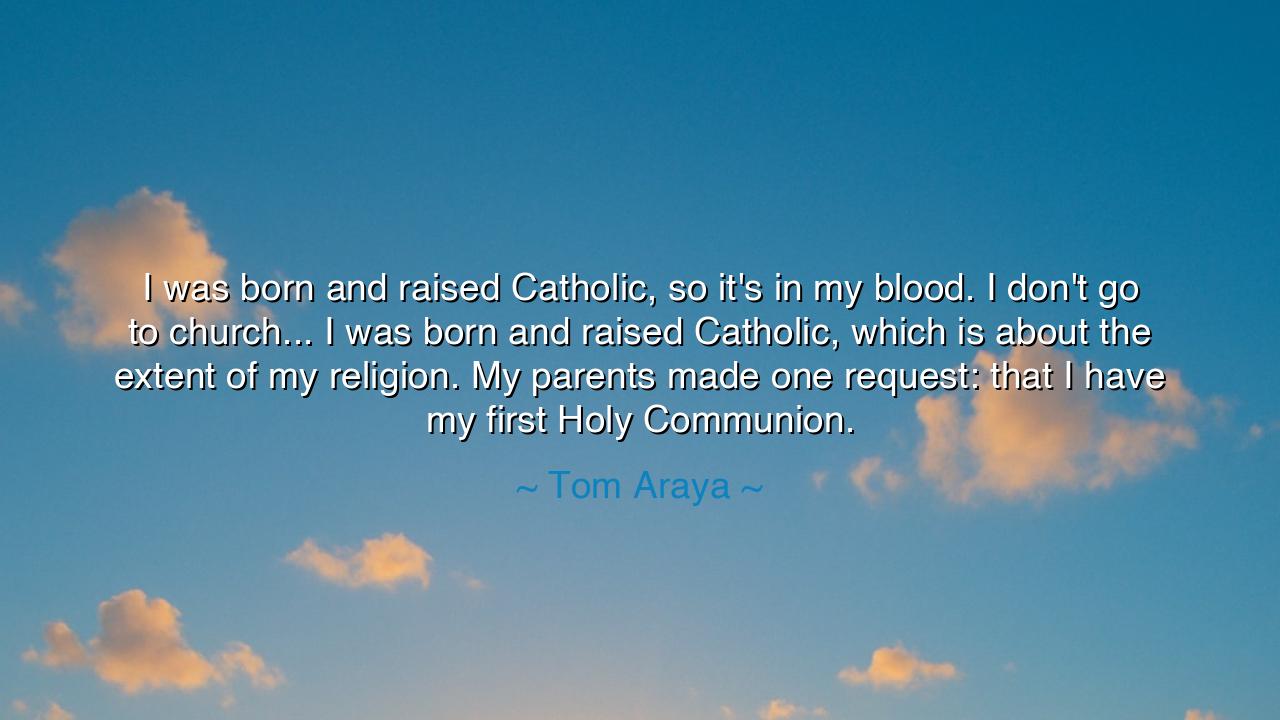
I was born and raised Catholic, so it's in my blood. I don't go
I was born and raised Catholic, so it's in my blood. I don't go to church... I was born and raised Catholic, which is about the extent of my religion. My parents made one request: that I have my first Holy Communion.






The words of Tom Araya—“I was born and raised Catholic, so it’s in my blood. I don’t go to church... I was born and raised Catholic, which is about the extent of my religion. My parents made one request: that I have my first Holy Communion.”—speak with the honesty of one who carries faith not as a daily practice, but as a memory of origin, a thread tied to family and childhood. They are not words of defiance, nor of piety, but of recognition: that religion, even when it is no longer fully embraced, leaves an imprint on the soul, shaping one’s identity in ways both subtle and profound.
The origin of this reflection is Araya’s upbringing in a Catholic household, where rituals such as First Holy Communion marked a passage from innocence into tradition. His parents, like countless before them, desired for him at least this initiation, a symbolic act that tied him to the centuries-old rhythm of the Church. Yet his confession that Catholicism is “in [his] blood” but not in his practice speaks to a tension familiar to many: the difference between heritage and conviction, between the faith of one’s parents and the path one chooses as an adult.
This same tension has echoed through history. Consider the tale of Voltaire, who was baptized and raised within the Catholic faith but grew into one of the fiercest critics of the Church in Enlightenment France. Though he did not carry forward its rituals, he never ceased to grapple with its presence in his life and culture. Like Araya, Voltaire showed that one may depart from the daily practice of a religion, yet still acknowledge its deep imprint upon the spirit and the society that formed them.
Araya’s words also remind us of the enduring power of family in shaping religious identity. His parents’ single request—that he make his First Communion—reveals how religion often acts as a bridge between generations. Even when belief weakens, the ritual remains a way of honoring ancestry, of showing respect for those who came before. It is a reminder that faith is never only about the individual; it is about the bonds of kin, the inheritance of memory, the silent wishes of parents who long to see their children touched by the sacred.
At its heart, his reflection is about identity. To say Catholicism is “in [his] blood” is to recognize that religion is not merely doctrine, but culture, history, and belonging. It shapes the songs sung in childhood, the symbols remembered, the festivals celebrated, even if one no longer attends the Mass. Religion, in this sense, is both personal and collective: even in absence, it continues to whisper.
The lesson here is both simple and profound: even if your path diverges from the faith of your parents, honor the roots from which you sprang. You may not carry every ritual forward, but do not despise the heritage that shaped your first steps. Like Araya, acknowledge what is “in your blood,” whether you walk in it daily or only hold it as memory. To forget entirely is to sever yourself from history; to remember, even without strict observance, is to walk with humility.
Practically, this means finding a balance between past and present. If you no longer practice your childhood faith, ask yourself what values it instilled that remain true. Perhaps it taught you reverence, or compassion, or the importance of community. Honor these gifts, even if you no longer follow the rituals. And if your family asks for a gesture of respect, as Araya’s parents did, consider fulfilling it not as obligation, but as love—for in honoring them, you honor the story of your own becoming.
Thus, Tom Araya’s words shine with the quiet wisdom of honesty: religion may fade from practice, but it lingers in memory, in blood, in heritage. To recognize this is not hypocrisy, but truth. For even when we walk new paths, the echoes of our past faith travel with us, shaping who we are, reminding us always of where we began.






AAdministratorAdministrator
Welcome, honored guests. Please leave a comment, we will respond soon